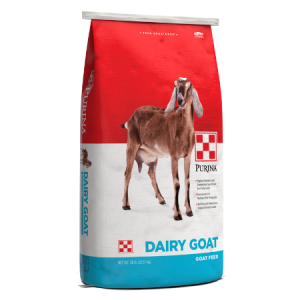Purina Dairy Goat Parlor 16
 Purina Dairy Goat Parlor 16 is a wholesome pelleted feed. It is formulated to support optimum milk production in lactating dairy goats. Plus, this feed is designed to deliver the nutrition and performance you expect from Purina. That’s why you will be able to see the difference Purina Dairy Goat Parlor 16 can make in your goats’ overall growth and health.
Purina Dairy Goat Parlor 16 is a wholesome pelleted feed. It is formulated to support optimum milk production in lactating dairy goats. Plus, this feed is designed to deliver the nutrition and performance you expect from Purina. That’s why you will be able to see the difference Purina Dairy Goat Parlor 16 can make in your goats’ overall growth and health.
Have questions? Reach out to our friendly staff at any of our local Farmers Co-op locations. Also, be sure to follow us on Facebook for product updates, news and events.
Guaranteed Analysis
Crude Protein, (min) 16.00%
Crude Fat, (min) 3.00%
Crude Fiber, (max) 8.00%
Acid Detergent Fiber (ADF) 11.00%
Calcium (Ca), (min) 0.70%
Calcium (Ca), (max) 1.20%
Phosphorus (P), (min) .0.60%
Salt (NaCl), (min) 0.25%
Salt (NaCl), (max) 0.75%
Copper (Cu), (min) 20.00 ppm
Copper (Cu), (max) 25.00 ppm
Selenium (Se), (min) 0.60 ppm
Vitamin A, (min) 7,500 IU/lb
Vitamin D3 , (min) 750 IU/lb
Vitamin E, (min) 30 IU/lb
Feeding
Feed this product according to production requirements (1 pound of lactation ration per every 2 quarts of milk produced) along with good quality forage free-choice. Do not dilute with grain. Feed intake will vary with forage quality, life stage, environment and activity level.
Important:
1. Start kids on colostrum milk from birth to 3 days of age; feed Purina® Kid Milk Replacer from 2 days until 4-8 weeks of age.
2. If kids have not been creep fed or they were purchased, then they should be placed on grass hay on a free-choice basis after arrival.
3. When making a ration change, allow 3 to 5 days for animals to adjust to the new ration.
4. Keep a constant supply of complete feed available. Do not let fine material accumulate in feeders.
5. Provide adequate bunk space for each animal. Bunks should be well-protected and well-managed to prevent feed from becoming wet or moldy.
6. Provide a source of fresh, clean water at all times.
7. Feed Purina Goat Mineral free-choice.
8. Consult your veterinarian for the recommended health program for your local area. This includes internal and external parasite control. In groups of goats there are certain animals that experience chronic bloat, or other digestive disturbances and consequently, are poor performers. In addition, excess feed consumption, severe weather changes resulting in erratic feed consumption and poorly managed feeding practices, can increase the incidence of bloat in all goats. If bloating occurs, the above management practices should be reviewed and your veterinarian consulted.
Caution: Store in a dry, well-ventilated area protected from rodents and insects. Do not feed moldy or insect-infested feed to animals as it may cause illness, performance loss or death. This product contains copper and should not be fed to sheep.


